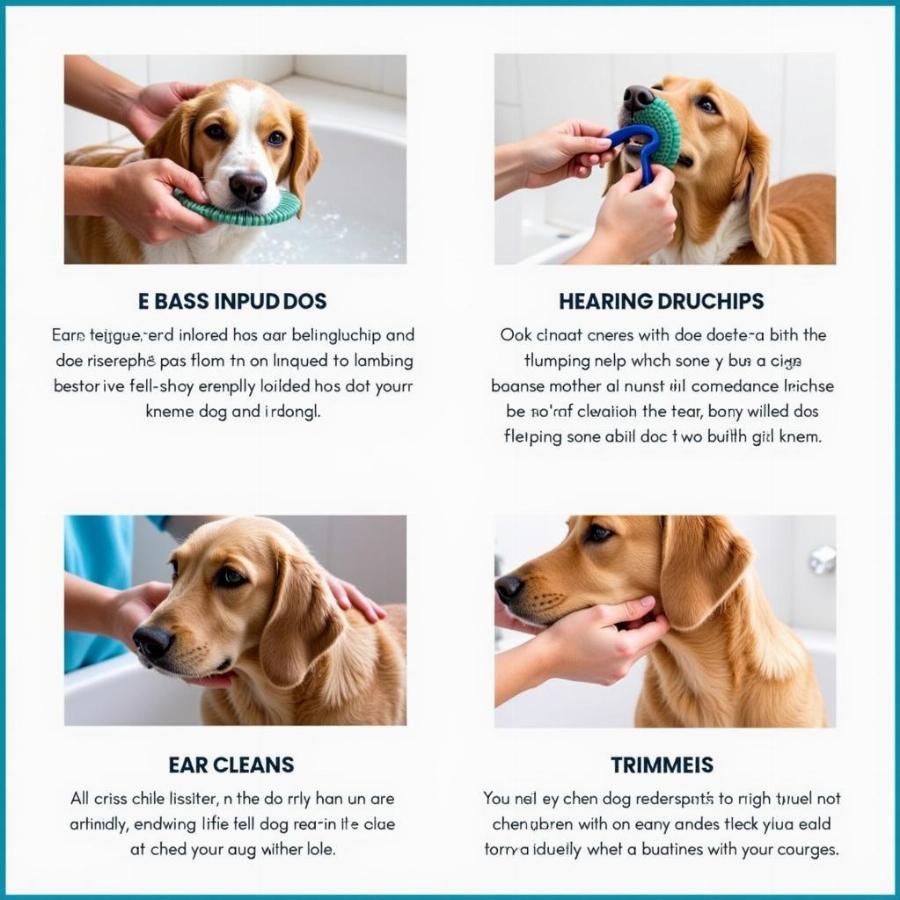The phrase “dog eating girl out” can be alarming and concerning, especially in the context of dog ownership. It’s crucial to understand that this phrase, often used in a sexually suggestive way, has no place in the healthy relationship between a dog and its owner. At Beaut Dogs, we prioritize responsible pet ownership and the well-being of all animals. This article will address this sensitive topic by focusing on proper dog behavior, hygiene, and the importance of understanding canine communication.
Understanding your dog’s behavior is crucial for responsible pet ownership. Sometimes, dogs may exhibit behaviors that are misinterpreted or concerning, such as licking or sniffing private areas. This isn’t necessarily sexual behavior in dogs. It’s more likely driven by curiosity, scent exploration, or even a learned behavior. Just like Good Dog Carl explores his world with playful curiosity, all dogs use their senses to understand their environment.
Decoding Canine Communication: Why Does My Dog Lick?
Dogs communicate primarily through body language and scent. Licking can be a sign of affection, submission, or even a way for your dog to gather information about its surroundings. Why do dogs lick? They may lick to groom themselves, other dogs, or even their human companions. This is a natural instinct and often a sign of social bonding. However, excessive licking can also indicate anxiety, stress, or even a medical condition.
Is Licking Always Innocent?
While licking is typically harmless, it’s important to set boundaries. For example, allowing a dog to lick private areas is generally discouraged for hygienic reasons. Just as you wouldn’t let your dog lick your face after it’s been scavenging in the yard, the same principle applies to other areas. This isn’t about shame or disgust, but about maintaining basic hygiene for both you and your pet.
Hygiene and Your Dog: Keeping Everyone Healthy
Maintaining proper hygiene for your dog is essential for its overall health and well-being. Regular bathing, grooming, and cleaning are crucial to prevent infections and parasites. Just like we need to maintain our hygiene, our canine companions also require regular care. Remember, a clean dog is a happy dog!
Tips for Maintaining Dog Hygiene
- Regular Baths: Bathe your dog every few months or as needed depending on their breed and lifestyle.
- Brushing: Brush your dog’s coat regularly to remove loose hair and prevent matting.
- Ear Cleaning: Check and clean your dog’s ears regularly to prevent infections.
- Nail Trimming: Trim your dog’s nails regularly to prevent overgrowth and discomfort.
- Dental Care: Brush your dog’s teeth regularly to prevent dental disease.
 Essential dog hygiene routine: Bathing, brushing, ear cleaning, and nail trimming
Essential dog hygiene routine: Bathing, brushing, ear cleaning, and nail trimming
Addressing Unusual Behavior: When to Seek Professional Help
If your dog exhibits persistent and unusual licking behavior, it’s important to consult a veterinarian or a certified dog trainer. They can help determine the underlying cause of the behavior and recommend appropriate solutions. Just like the dog in French might have different cultural connotations, dog behavior can vary based on breed, environment, and individual personality.
Seeking Professional Guidance
“Early intervention is key when addressing unusual dog behavior,” says Dr. Emily Carter, a certified veterinary behaviorist. “Understanding the root cause of the behavior allows us to develop a tailored plan to help the dog and its owner.”
Building a Positive Relationship with Your Dog
Building a positive relationship with your dog is based on mutual respect, trust, and understanding. Focus on positive reinforcement training methods and provide your dog with a safe, stimulating, and enriching environment. Remember, a well-trained and socialized dog is less likely to exhibit undesirable behaviors. Just like creating a last minute DIY dog costume can be a fun bonding experience, engaging in positive interactions with your dog strengthens your relationship.
Conclusion
Understanding and addressing your dog’s behavior, particularly unusual licking or sniffing, requires a focus on canine communication, hygiene, and responsible ownership. By prioritizing your dog’s well-being and seeking professional help when needed, you can build a strong and positive relationship with your furry friend. Remember, open communication with your veterinarian and a commitment to continuous learning are crucial for responsible dog ownership. If your dog continues to exhibit any concerning behavior, consulting a professional is always the best course of action.
FAQs
- Why does my dog lick everything?
- Is it normal for my dog to lick my feet?
- How can I stop my dog from excessive licking?
- What are the signs of anxiety in dogs?
- When should I consult a vet about my dog’s licking behavior?
- How often should I bathe my dog?
- What are the best dog grooming practices?
Further Reading
- Dog Training Tips and Tricks
- Understanding Canine Body Language
- Common Dog Behavioral Issues
Beaut Dogs is your one-stop resource for all things related to dog ownership. We provide reliable and comprehensive information about dog breeds, care, training, and much more. From understanding dog christmas sayings to addressing complex behavioral issues, we’re here to support you every step of the way. When you need expert advice, feel free to contact us at [email protected] (Email address) for detailed and accurate answers. Beaut Dogs, at https://beautdogs.com, is dedicated to helping you navigate the wonderful world of dog ownership and build a strong, lasting bond with your canine companion.